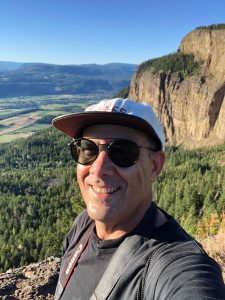Saeed Sabzian is a Lecturer in the Department of English and Cultural Studies. He specializes in the theory of rhetoric in an interdisciplinary scope, using multimodal frameworks in the analysis of language, literature, cinema and culture in general. Saeed has taught courses in rhetoric, composition, literature, and communication in the sciences and engineering. He has translated several literary theory and fictional books from English to Farsi and has published a book on disability studies.
Dr. Sabzian shared some insights on his research and teaching practices here at UBC Okanagan.
What brought you to UBCO
The wide spectrum of programs and courses at UBCO is a great fit for my interdisciplinary interests, where I see opportunities for research and teaching rhetorical theory in most of the programs that FCCS offers such as Visual Culture, Aural Culture, Creative Writing, Cultural Studies, English, and Media Studies, Science Communication, and more.
Tell us about your research/teaching interests and what excites you about your field of work
I am interested in bringing rhetorical theory into an interdisciplinary framework to explain cultural artefacts, literary texts, film. I engage in these by combining classical concepts in rhetoric with more modern fields of study, such as cognitive science, sound studies, visual theory, and narratology to draw meanings hidden to non-interdisciplinary methods of study. I have utilized these hybrid regimes of analysis to explain anxiety in American culture as signaled in novels and films. I’m excited about the abundance of interdisciplinary activities in the realm of rhetoric. With the transition of universities toward interdisciplinary research in social and cultural phenomena, I see exciting opportunities to explore my favorite topics in culture, language, philosophy, science and technology.
How did you know you wanted to be a professor
Years ago, while I was a high school English teacher, I used to teach translation, literature, and literary theory. This experience brought my two passions together: I could teach and publish the same ideas, expanding my reach in the two realms. I think the desire to become a professor was incepted there.
What kind of learning experiences do you offer your students
Experiences that would equip students with life-long skills by internalizing these experiences through practice. Among these is “critical thinking”, which is vital to students “flourishing” in life, a skill that I foster through broadening students’ perspectives by exposure to conflicting perspectives. Th experience of adopting an enlarged perspective on the world (science, technology, and people) enhances students’ reasoning, argumentation, and cooperation with others.
What is your process in writing
My most recent publication began with several books in translation, basically fiction, literary theory, and literary dictionaries. Following a co-authored literary lexicon in 2009, I shifted to multimodal rhetoric, researching how rhetoric can be used to explain the psyche and motives of a culture through its manifestation in language, sounds, and images, for example anxiety in American culture in postapocalyptic films. Post-2015, I published a book in Farsi on Disability Studies, from the perspective of interdisciplinary rhetoric. Currently, I am re-shaping my research for publication, while I am also exploring the real of “rhetoric of science”.
What do you enjoy about living here and working at UBC Okanagan
I like UBCO both for its positive and diversified environment, and for its location on the landscape of Okanagan, which draws me to daily connection with nature. I was born in a mountainous small town, so I am endlessly interested in and grateful for the Okanagan mountains, lakes, and woods, where I enjoy hiking, walking, swimming, and paddling in the Okanagan. UBCO’s campus is a place of positivity, cooperation, and connectedness.
